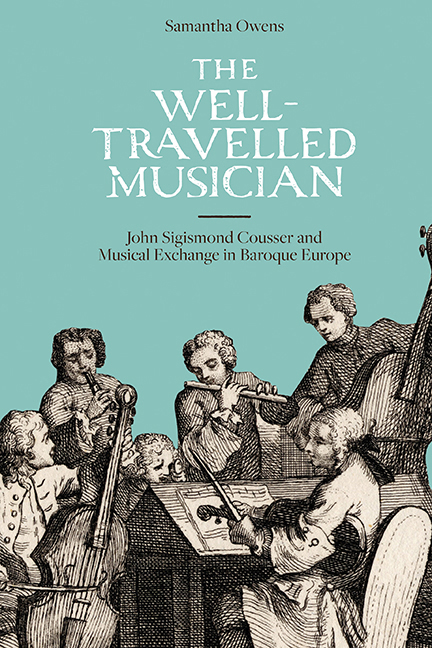Book contents
- Frontmatter
- Dedcation
- Contents
- List of Tables
- Preface
- Abbreviations
- Notes on Sources
- Introduction: John Sigismond Cousser and his ‘Commonplace Book’
- 1 Hungarian Beginnings and the Adoption of French Musical Style
- 2 Kapellmeister at the Wolfenbüttel Court and Braunschweig Opera House
- 3 Ariadne to Porus: Cousser's Braunschweig Operas
- 4 ‘The Incomparable Director’ in Hamburg, Nuremberg and Augsburg
- 5 Heliconische Musen-Lust: Opera at the Württemberg Court
- 6 ‘Il Paradiso terrestre’? Cousser in London
- 7 ‘Fortune not Blind’: Music for Dublin Castle
- 8 ‘Our Concert’: A Musician at Home
- 9 Cousser's ‘collection of fine musick’ and the Practicalities of Musical Exchange
- Appendix 1 Summary of the Contents of Cousser's ‘Commonplace Book’
- Appendix 2 Cousser's Address Book
- Appendix 3 Cousser's Books of Cantatas, Madrigals, Duets and Serenatas
- Appendix 4 Cousser's Inventory of Ouverture Incipits
- Appendix 5 Transcription of Cousser's Notes for his 1716 Trip to London and the Continent
- Bibliography
- Index
- Titles listed here were originally published under the series title Music in Britain, 1600–1900
- New titles published under the series title Music in Britain, 1600–2000
5 - Heliconische Musen-Lust: Opera at the Württemberg Court
Published online by Cambridge University Press: 30 August 2019
- Frontmatter
- Dedcation
- Contents
- List of Tables
- Preface
- Abbreviations
- Notes on Sources
- Introduction: John Sigismond Cousser and his ‘Commonplace Book’
- 1 Hungarian Beginnings and the Adoption of French Musical Style
- 2 Kapellmeister at the Wolfenbüttel Court and Braunschweig Opera House
- 3 Ariadne to Porus: Cousser's Braunschweig Operas
- 4 ‘The Incomparable Director’ in Hamburg, Nuremberg and Augsburg
- 5 Heliconische Musen-Lust: Opera at the Württemberg Court
- 6 ‘Il Paradiso terrestre’? Cousser in London
- 7 ‘Fortune not Blind’: Music for Dublin Castle
- 8 ‘Our Concert’: A Musician at Home
- 9 Cousser's ‘collection of fine musick’ and the Practicalities of Musical Exchange
- Appendix 1 Summary of the Contents of Cousser's ‘Commonplace Book’
- Appendix 2 Cousser's Address Book
- Appendix 3 Cousser's Books of Cantatas, Madrigals, Duets and Serenatas
- Appendix 4 Cousser's Inventory of Ouverture Incipits
- Appendix 5 Transcription of Cousser's Notes for his 1716 Trip to London and the Continent
- Bibliography
- Index
- Titles listed here were originally published under the series title Music in Britain, 1600–1900
- New titles published under the series title Music in Britain, 1600–2000
Summary
❧ Cousser's Operas in Stuttgart
After the trials of his freelance operatic seasons in Nuremberg and Augsburg, Cousser was surely ready to work once again in a more stable environment, preferably one in which financial pressures and administrative responsibilities were significantly reduced. While concrete evidence is elusive, Cousser had certainly returned to Stuttgart by 11 October 1698, when he appears to have directed a performance of a pastorale entitled Erminia, oder Die in Liebe verwandelte Widerwertigkeit for the twenty-third birthday of Princess Eberhardina Louisa, the sister of Duke Eberhard Ludwig of Württemberg. This was one of a string of German-language productions staged by Cousser for the court during the latter months of 1698, which included two of his own operas, Porus and Jason, as well as Bassani's Alarich in Pulcheriam (which had been performed by him in Nuremberg the previous year) and Lully's Acis et Galatée (which Cousser had directed at Hamburg in 1695). The printed libretto of a further work, the one-act pastoral (‘Hirten-Gedicht’), Der Verliebte Wald, described on the title page as a ‘High German Singspiel’, contains a dedication to Duke Eberhard Ludwig of Württemberg signed by Cousser, but is undated: a pencil annotation gives the year as 1698 but there is no additional information regarding whether the opera was ever performed. In fact, of these six works only Erminia can be linked with any certainty to a specific performance date that year. References in the prologue for the Stuttgart 1698 production of Jason indicate that the opera was presented to mark either the birthday of Eberhard Ludwig's wife, Johanna Elisabeth of Baden-Durlach (3 October), or that of his sister Princess Magdalena Wilhelmina of Württemberg (7 November).
Clearly, Cousser had been able to use his prior connections to the Württemberg court to his advantage, as well as capitalize on the region's relative stability, a situation due largely to the Peace of Ryswick, which had been signed on 20 September 1697. The 22-year-old duke – who was not otherwise known for his love of music – no doubt recognized the value of opera as a political tool and sanctioned the necessary expenditure accordingly.
- Type
- Chapter
- Information
- The Well-Travelled MusicianJohn Sigismond Cousser and Musical Exchange in Baroque Europe, pp. 80 - 96Publisher: Boydell & BrewerPrint publication year: 2017

